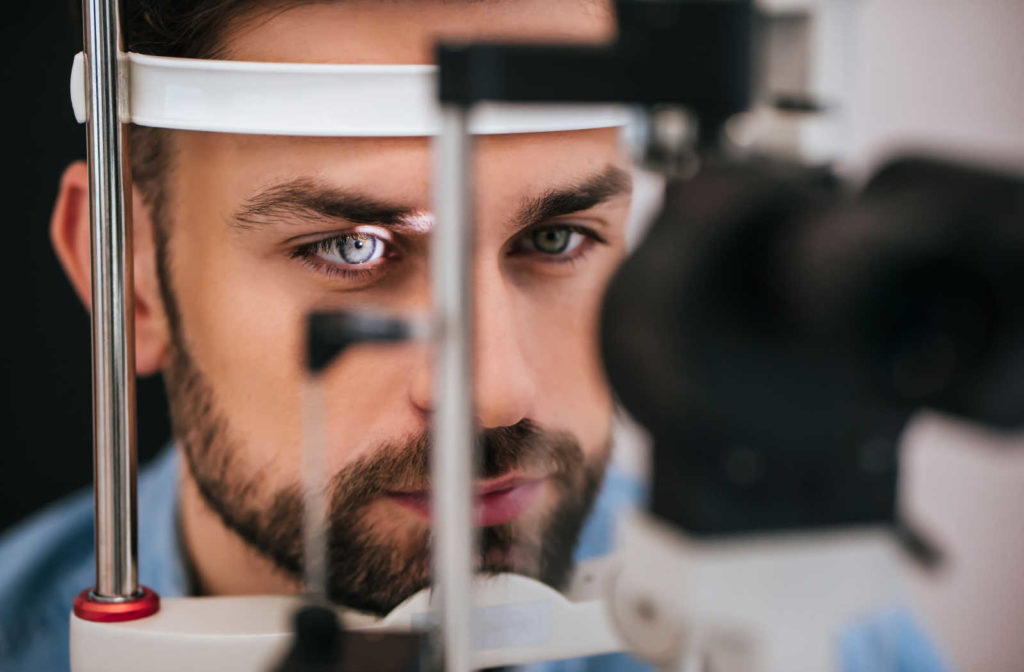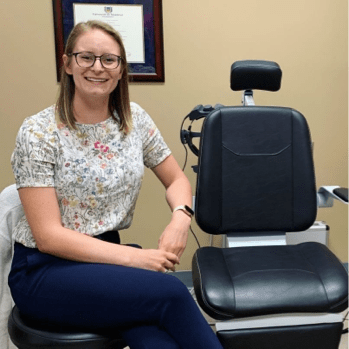Your eyes and your brain have a direct relationship: your eyes are essentially an extension of your brain. This connection helps you see, perceive objects, and understand the world around you. When you have a concussion, this relationship can become damaged. But vision therapy can help you heal and restore the connections.
Understanding the Relationship Between Your Brain & Eyes
Your retinas, the light-sensitive tissue at the back of your eyes, transmit light signals and colour into electric signals, which are relayed to several areas of your brain. This transition creates the images you see when you look out into the world.
You can think of your eyes like a computer monitor with cords attached to different parts of the computer (your brain). If any connecting cords are knocked out of place or frayed, you may not get a clear image on your monitor.
Your eyes connect to your brain with a long cable called the optic nerve. And your optic nerve has millions of fibres, and damage to this critical connection can cause changes to your vision and vision impairment.
What Is a Concussion?
A concussion is a mild traumatic brain injury that results from whiplash or a blow to the head, causing it to move rapidly, sometimes twisting and bouncing in the skull. These rapid movements can cause the brain tissue to change shape and stretch, damaging brain cells.
A concussion isn’t the only form of a brain injury. You can also experience impairment due to strokes, brain tumours, brain surgery, and neurotoxins like chemicals, mold, and Lyme disease.
Concussions are often referred to as “mild” because they’re not life-threatening. However, they’re still serious, and the effects can be quite dangerous.
Signs of a concussion include:
- Loss of consciousness
- Balance issues
- Glazed-over eyes
- Amnesia & forgetfulness
- Delayed responses
- Inappropriate emotional regulation (laughing/crying)
- Vomiting
If you have experienced a concussion, you may have:
- A sudden headache
- Lightheadedness
- Dizziness
- Memory problems or loss of focus
- Sensitivity to light or noise
- Difficulty paying attention
- Changes in sleeping patterns
- Unusual emotional states like anxiety, depression, or panic attacks
If you think you have sustained a concussion, it is important to see your doctor right away. If you are diagnosed with a concussion, they can help determine a treatment plan for you.
Concussion: Visual Symptoms
Those with a concussion may experience either temporary or long-lasting changes in their vision. How the eyes are affected varies from person to person, but impacts can include:
- Double vision: When the images from each eye seem to overlap or double-up.
- Accommodative dysfunction: Difficulty quickly focusing between near to far objects.
- Convergence insufficiency: Eyes drifting outward when focusing up close.
- Sensitivity to light: Squinting in the light or seeing glare or halos around lights.
- Eye tracking issues: Difficulty following a moving object or moving your eyes along an object.
- Delayed visual processing: Slower response times based on visual information.

What Can Vision Therapy Do to Help Concussion Vision?
Vision therapists trained in concussion and neuro-visual rehabilitation can assess your symptoms and create a treatment plan tailored to your needs and goals.
An acquired brain injury evaluation looks into the affected visual skills and can include:
- How well your eyes work together.
- How well and how quickly your eyes focus at varying distances.
- Your sensitivity to light.
- If you experience visual processing errors.
Many people who experience a traumatic brain injury also suffer from visual dysfunctions, so it is important to have your vision assessed by an optometrist.
A binocular vision assessment and acquired brain injury assessment are coupled together to assess the way your eye teamwork has been affected by your brain injury. These assessments take 2.5 hours to complete, but they can be broken up into a few sessions. Following your assessments you will receive a detailed report with recommendations which may include vision therapeutic lenses, vision therapy, and referrals to allied professionals as needed.
How Does Vision Therapy Work?
Vision therapy is an individualized treatment plan designed to address your specific needs and encourage your brain and eyes to function better together. After your assessment, your optometrist creates a plan to improve your visual skills using several different methods.
Some vision therapy tools can include:
- Therapeutic lenses
- Prisms and filters
- Electronic targets
- Timing mechanisms
- Balance boards
The work you do with your vision therapist can help you achieve your goals, but it is important that you remember to complete your at-home exercises to continue building the visual skills you are working on.
The Road to Recovery
Your vision will not improve overnight. But with consistent work and dedication, you can strengthen how well your eyes and brain function together with the help of vision therapy. Beyond 20/20 Optometry wants to help you on your road to recovery. Get started by booking an appointment and having a discussion with our team about your symptoms and goals today.




